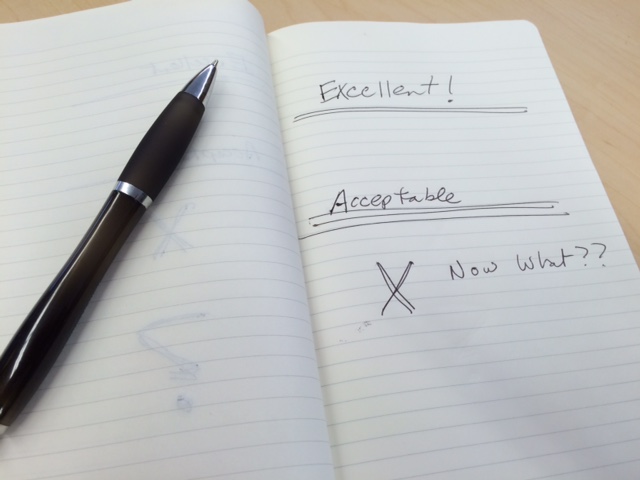Drawing the Line
Back in November I posted, “Holding the Line,” arguing that leaders have a broad, important responsibility to execute directives from higher in their organizations. On that basis, we sometimes have to take actions or uphold standards for our team members, even when we do not fully agree with those actions or standards. I also promised to explore the topic from its flip side: where do we draw our own line? In other words, what should we do when we cannot, in good conscience, do what we are told to do? The answer depends, in part, on the reasons for our conscientious objection.
Sometimes we disagree because a directive is inconsistent with our preferences, but doesn’t violate any substantive principles. (I am grateful to my friend Pastor Dan Carlson of Public Safety Ministries for periodically reminding me of the distinction between principles and preferences.) For example, I prefer to be informal, but I work for a few organizations that are very formal. I am a guest in their houses. As such, I address people by their titles, and try to act naturally when people address me as “Dr. Weinstein.” I don’t cuss. I speak in complete sentences. Working with others, especially working under another’s direction, often means that we have to do things in ways that wouldn’t be our first choices. So be it. We ought to draw the line over principles. Often we can be much more accommodating about preferences.
There are situations when we are directed to do things that violate our personal principles or values. Working in an organization with values that conflict with our own is enormously stressful. That doesn’t necessarily mean that either we or the organization are doing anything wrong, but it does mean that we have some work to do. Years ago, I worked for a firm that made a strategic shift from a customized, high-value, high cost service to a lower-cost, one-size-fits-all approach. There is nothing morally wrong with that shift, but I didn’t want to spend my days containing costs and trying to solve 60-80% of our customers’ problems. I prefer to partner with clients and to provide highly customized services. I did my best to influence the strategic decision, and when I was not able to do so, I made the decision to move on. I sought outside opportunities and continued to do my job to the best of my ability.
Finally, there are times when we believe that a directive is illegal or morally wrong. Our first responsibility is to challenge our own belief. That begins with learning about the directive and about the relevant laws, regulations, or ethical principles in play. Keep an open, curious mind, and apply ELA’s Principles of Charitable Interpretation:
- I will assume that the person I am working with is competent and well-intentioned.
- I will assume that an idea presented to me is fundamentally reasonable, even if I disagree.
- I will maintain these assumptions until they are proven wrong.
All too often I am both certain and mistaken. Our initial conclusions may be based on incomplete information. Be humble, listen, and really seek to understand the situation.
If, based on appropriate information (and expert opinions, as necessary), we conclude that a directive is wrong, then we have a duty to use our influence to change it. Frame your argument in clear terms, supported by good facts and valid logic. Offer thoughtful solutions, not just problem statements. Begin with the standard management structure and/or chain-of-command, and normal means of communications. Start there, but don’t stop there, using appropriate means to escalate your concern within the organization as necessary. Remain flexible and open in your thinking as you seek to influence others to do the right thing.
If you believe that injustice or real harm is being done, that the situation must be remedied, you may need to draw the line, even speaking out or taking action outside the organization. You may want to consult legal counsel before doing so. These actions are often called “blowing the whistle,” and much has been written about the moral and practical implications of whistleblowing. In any case, don’t go it alone. Maintain your own moral compass, in part by staying connected with those people whom you trust. (My book, Thinking Aloud, includes an essay entitled, “Virtue Friends” on the power of those relationships.) Engage your mentors and trusted friends in confidential, candid conversations.
There are many resources to support justified whistleblowing, but going down that path comes at a cost. It takes great moral courage as well as clarity and skill to do the right thing under those difficult circumstances. This blog post is too brief, and circumstances are too variable, to provide sound advice for those who seek to affect organizational change by speaking out about the organization. Seek professional and expert advice early and often. Take care of yourself, in all respects.
Of course, we hope it never comes down to leaving a job or blowing the whistle. Very often, we can influence more senior leadership to avoid or correct mistakes simply by speaking up and by participating appropriately in decision-making. Still, it is helpful to consider what we are willing and able to do, before we find ourselves in a moment of truth. And, the prior discussion of the duty to follow must be balanced by some discussion of our duty to speak out when necessary.






Leave a Reply
Want to join the discussion?Feel free to contribute!